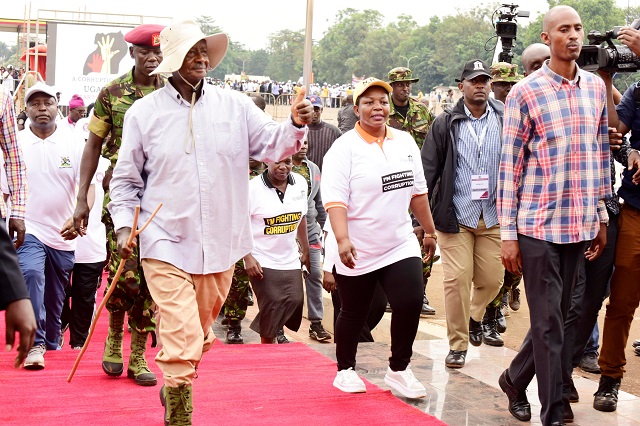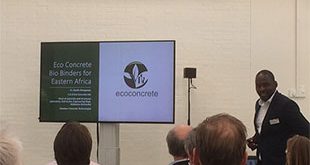
How poor countries indulge in rituals of fighting corruption even when it is the glue that holds things together
THE LAST WORD | ANDREW M. MWENDA | December 09 was anti-corruption day. Elites in media, academia, “civil society” and government were grandstanding in self-righteous indignation, condemning the government for doing little or nothing about it. Many were steeped in simplistic moral posturing that is routine and banal. Their arguments contribute little to our understanding of the challenge we face.
Corruption has endured, especially in Africa. Our continent has had many changes of government over the last 60 years: Nigeria 15, Ghana 13 etc. Every government has come to power promising to fight corruption. It has kept or left it being accused of corruption. Critics claim there is little or no political will to fight it. But when these critics have come to power, except for variations in detail, corruption has gotten worse.
President Yoweri Museveni came to power promising to fight graft. He has presided over the most corrupt government in Uganda’s history. This, in large part, explains why he has lasted longest. This is not a moral judgment on his leadership. I do not think he would (and can) govern Uganda without corruption. It is just a statement of fact. I believe many opposition politicians genuinely believe corruption can be defeated. However, if they came into power, they would be just as corrupt.
I grew up reading about African politics. Accusations of corruption, tribalism and repression were the main reason behind every military coup, popular insurrection, electoral struggle, civil war and popular anger against every government.
I joined journalism to contribute to the fight against these evils. I have spent the last 27 years of my journalism and intellectual career investigating and writing about corruption. I have published many investigative stories, academic papers and even a book on this subject. This humbled me with a degree of moral distance that is depressing but also illuminating.
I began by trying to understand governance strategies in Africa. But I needed to look beyond Africa to gain a broader perspective – and that is what philosophy demands. I delved into the governance strategies of rich and poor countries across time and space. I studied the history of Western countries when they were still poor, at the same level of per capita spending as our governments today. I discovered that I was thinking in a moral and ethical box handed to us by the modern state whose origins lie in the experience of rich Western countries but provide little or no reference to our reality.
There are many sources of legitimacy for governments. However, critical to the legitimacy of the modern state is the ability of the state to provide a large basket of public goods and services to all its citizens. This governance model requires high levels of social organisation and lots of money. Poor countries don’t have these two endowments to govern this way. So, they rely on cheaper and affordable strategies of governance – repression and patronage.
Poor countries of today inherited the ethical and moral architecture of their governance from departing colonial powers and/or as copy and paste values based on “best practice” in rich Western countries. Yet reading the history of the West showed me that these ethical and moral values had not always been the basis of their governance. When still at the same level of per capita spending as us, the state did not provide a large basket of public goods and services to all citizens. Instead, governments in the West managed their societies using similar cheaper and affordable strategies of governance our leaders employ today – repression and patronage.
In fact, most of the practices we call corruption today were perfectly legal and ethical in all of Europe and North America at the turn of the 20th century. The current ethical and moral governance code of the West evolved out of the transformation from poor, agrarian societies into rich industrial nations. There were many factors that occasioned this change in governance strategies. But the most critical part was growth in state revenues. This gave the governments enough resources to buy legitimacy through the provision of a large basket of public goods and services.
Poor countries adopted this architecture of governance. But they lack the financial and a developed social organisation to deliver on it. So, our nations are over developed in functions but under developed in capacity – their reach goes far beyond their grasp.
The consequence of this mismatch between ambitions and resources leads inevitably to corruption. Meagre resources are spread too thinly across a large territory that is sparsely populated. Then they are placed into the hands of myriad state employees with limited skills and oversight to do the job. Corruption and incompetence are inevitable byproducts of this effort.
Because financial and human resources available cannot deliver the large basket of public goods and services, governments find it cheaper (and affordable) to invest in buying-off elites in the different ethnic or religious communities with patronage. In exchange, these elites create a bridge between the state and their constituents. This forms the basis for the politicisation of ethnicity. Ambitious people make moral, cultural, and psychological appeals to identity to gain the following of particular constituencies, and leverage this following to gain positions of power and influence. And they sustain these through the distribution of material benefits to their constituents by indulging in activities that are largely corrupt.
At lower state levels of a teacher, a nurse or police officer, government wages are near or below subsistence. Government pretends to pay its employees and they also pretend to work for it. The lower cadres of the state keep in their official jobs because of the opportunities to earn extra income by exploiting their power. Without such a practice, public service would not attract many of its cadres and it would just wither away.
At the top, corruption is the glue that holds the flabby and heterogenous coalition of powerful religious and ethnic elites together. Then below, corruption is the grease that turns the wheels of the state because public sector employees work in large part because their official incomes are supplemented by unofficial earnings through corruption.
Therefore, corruption is the way the system works not the way it fails. By adopting the ethics of a modern state at very low levels of public spending, we have criminalised the very governance strategies that allow our states to function. This conclusion is frustrating but realistic. It means that we need to see corruption not as a problem which we can solve but one we should manage.
****
 The Independent Uganda: You get the Truth we Pay the Price
The Independent Uganda: You get the Truth we Pay the Price




Ergo, the question arises; with Uganda’s average growth rate, how long will it take or when will we reach an economic level where the state can provide a large basket of goods and services? Moreover, can an increase in educational enlightenment, culminating from a plethora of information from tech and internet advancements, expedite the time it would take to arrive at such a position?
Governance strategies ! And corruption is one of them. I’d you rather call them tactics and short term. If you had researched more you would hàve realised that colonialism ,slavery, Nazism,Zionism, apartheid and other blots on human dignity are premesised on well laid out intellectual discourses like you put here but ultimately there is a price to pay for this stupidity. Here in Uganda you can tell by our failure to retain or attract decent foreign direct investors. If you recall the recent news hype about the Hilton hotel intention to open shop in Uganda,you won’t question why it was hot air. The five star hotels constructed from stolen government monies are just a figment of some imagination the picture is different. The same goes for the manufacturing sector.
Thank you
There goes Andrew and his rumbling! He rumbles about corruption without telling us whether dishonesty/corruption is evil or not, and can be done a blow or not. Andrew does not tell us whether it is ok, for his staffs at the Independent to steal from it/him in order to build their 5-star Hotels or start a competing Independent Magazine.
This is the same Andrew who one time rumbled that “Land-grabbing is good and therefore functional for economic development. It was because his sister was dubiously grabbing UBC land worth Shs.10bn from the sales of goats. The same Andrew cannot tell us that it is due to nepotism or professional corruption and/or unethical for his Journalist trained sister, Hon Muhanga, to have been appointed Minister of State for Health.
Andrew’s view points above make some sense and to an extent he is right. However, portraying fighting corruption in Africa as is it is not good for governance is misleading. All the western countries, even where they were at the same level of development like in most African countries today, had people, associations, religious leaders and scholars fighting corruption. The fight against corruption in those countries was not achieved on a silver spoon or just granted. So, Andrew, don’t over criticise those who fight corruption. I also refer to the country that you used to write about-Rwanda. It ranks fairly well in corruption index & doesn’t have large basket of goods and services to provide for all its citizens. Has it fallen apart? Where is the ‘corruption glue’ that holds it together?
Stop talking about corruption. It is part of our society. The IGG was told to slow down in fighting the same.
i agree with you, andrew. i’ve argued a number of times that at our level of spending our countries cannot make the progress we want them to. as a result, some people have accused me of legitimising dictatorship. i’ve provided examples from the areas you’ve mentioned in your article, but still they accuse me of the same. i’ve a feeling that most of us don’t know that, in the absence of a significant number of sophisticated people, no country can make meaningful progress. repression may be necessary when we’re preparing enough elites and collecting the resources we so badly need!
But Mwafrika, what is so sophisticated about being honest? All we need in this country is honesty. Without which, no other level of sophistication can solve our backwardness. In other words, HONESTY is justice; honesty is fairness; honesty is harmony; honesty is sanity; honesty is reliability; honesty is prosperity and honesty is happiness for all.
Look around and see for yourself what the DISHONESTY the leadership and the people the lead is doing to this country: the widespread poverty; the chaos; the violence; the filth, the widespread suspicion; etc. In other words, as a country; the worst PANDEMIC we are faced with is not Covid-19, but DISHONESTY.
Mr. O, i’ve a feeling that we’re speaking at cross-purposes. I’m talking about the importance of having enough sophisticated people (a significant number of the “elite”). No society, however, honest it may be, can achieve the level and kind of progress we desire/need without that. Let’s allow history to be our guide.
Corruption is in every sector.